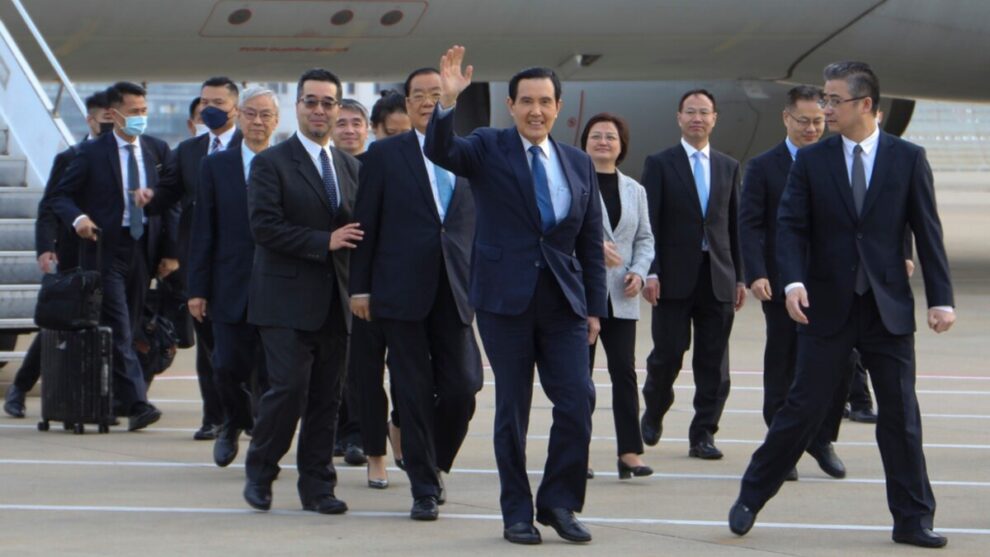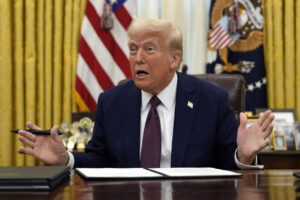China has increased diplomatic pressure on Taiwan since the ruling Democratic Progressive Party won a third consecutive presidential term last Saturday, poaching a diplomatic ally from Taiwan and criticizing countries that congratulated the island’s president-elect.
Some analysts say Beijing’s latest pressure campaign against Taiwan is part of its competition for influence with the U.S. in the Pacific region and an attempt to frame the DPP, which favors the preservation of Taiwan’s sovereignty, as incompetent.
“Beijing is working hard to ensure that the Taiwanese people view the DPP as incapable of safeguarding Taiwan’s international space,” Marcin Jerzewski, an analyst of EU-Taiwan relations at the Prague-based European Values Center for Security Policy, told VOA in Taipei.
Despite China’s success in luring away Nauru, one of Taiwan’s diplomatic allies, Jerzewski said he thinks these efforts do not have much impact on the Taiwanese people.
“The Taiwanese people don’t care all that much about Taipei maintaining relationship with formal diplomatic allies of the Republic of China,” he said, using Taiwan’s official name.
Under the Taiwanese Foreign Ministry’s Facebook post about Taipei’s decision to end diplomatic ties with Nauru, some Taiwanese people wrote that Taiwan doesn’t need diplomatic allies that only ask for financial aid while others said Taiwan should focus on deepening ties with the right partners.
During a press conference on Monday, the ministry announced the decision to end ties with Nauru, citing China’s ongoing effort to induce a diplomatic shift in the Pacific Island nation through the promise of financial aid as the cause.
Taipei characterized Beijing’s efforts as a retaliation against the outcome of its January 13 presidential election and said it was a blatant challenge to international order.
In response to Taiwan’s criticism, Chinese Foreign Ministry spokesperson Mao Ning said on Monday that Nauru’s decision to reestablish diplomatic relations with China shows that “the one-China principle is where global opinion trends and where the arc of history bends.”
Following Nauru’s decision on Monday, the American Institute in Taiwan, Washington’s de facto embassy in Taipei, issued a statement calling the development a sovereign yet “disappointing” decision. AIT warned that Beijing often “makes promises in exchange for diplomatic relations that ultimately remain unfulfilled” and encouraged all countries to deepen engagement with Taiwan.
The development reduces the number of Taiwan’s official diplomatic allies to 12. It also raises the question of whether the island should maintain diplomatic ties with these allies, which are all small countries that seek large amounts of financial aid.
“Formal diplomatic allies serve some tangible benefits, including speaking for Taiwan in international organizations, allowing for direct meetings with heads of state [and] preventing China from claiming total victory,” Timothy Rich, a professor of political science at Western Kentucky University, told VOA in a written response.
Despite these benefits, Rich said he thinks it will be difficult for Taiwan to win the “dollar diplomacy game.”
“China can always outbid [and] many of these countries have no incentive not to try to start a bidding war,” he said.
According to Taiwan’s Central News Agency, a Taiwanese diplomatic source said Nauru asked Taiwan for an aid package of about $83.23 million to maintain the operation of a detention facility. However, Taiwan could not shoulder the large amount of aid by itself, and Nauru switched diplomatic recognition to Beijing before Taipei gave the Pacific Island nation a final answer.
Apart from the tangible benefits, Jerzewski in Taipei said maintaining ties with formal diplomatic allies can also ensure Taiwan avoids abandoning its official name, the Republic of China.
“Formal diplomatic relationship is one institution of the ROC,” he told VOA, adding that Taiwan President Tsai Ing-wen has straddled a moderate line of not dismantling the ROC while diversifying the island’s international relations under the name of Taiwan.
While China poaches its diplomatic allies, Taiwan finds ways to deepen ties with like-minded democracies. Following the DPP victory, the U.S., Australia, the U.K., Japan, Singapore, and the Philippines all congratulated Taiwan’s president-elect Lai Ching-te.
In response, China issued stern objections to these countries and summoned the Philippine ambassador to China to warn Manila “not to play with fire.”
Rich said the support that Taiwan received shows China’s efforts to isolate Taiwan have failed, and it also reflects the strained relationship with China that some of these countries have.
“Taiwan has been remarkably successful in expanding unofficial relations, including in the region, and China can’t help but notice that,” he told VOA.
Jerzewski said other countries will view Beijing’s angry response as a sign that it is “not a rational and reliable player in international affairs.” Additionally, it will perpetuate the perception that “Beijing is a bully,” he said.
Some experts say that compared to its diplomatic ties with official allies, Taiwan’s unofficial relationships with like-minded democracies are much more crucial for the island as they can provide Taiwan with concrete benefits.
“For leaders in Taipei, what matters to Taiwan’s national interests are security and prosperity,” Chen Yu-hua, a political scientist at Akita International University, told VOA in a video interview.
In his view, compared to the formal diplomatic ties with small countries, Taiwan’s unofficial ties with the U.S. and Japan are important to Taiwan’s national interests.
“Relations with the U.S. and Japan can provide Taiwan security and prosperity,” he said, adding that Taiwan’s incoming government should continue to broaden relations with other democracies that won’t be easily swayed by Beijing.










